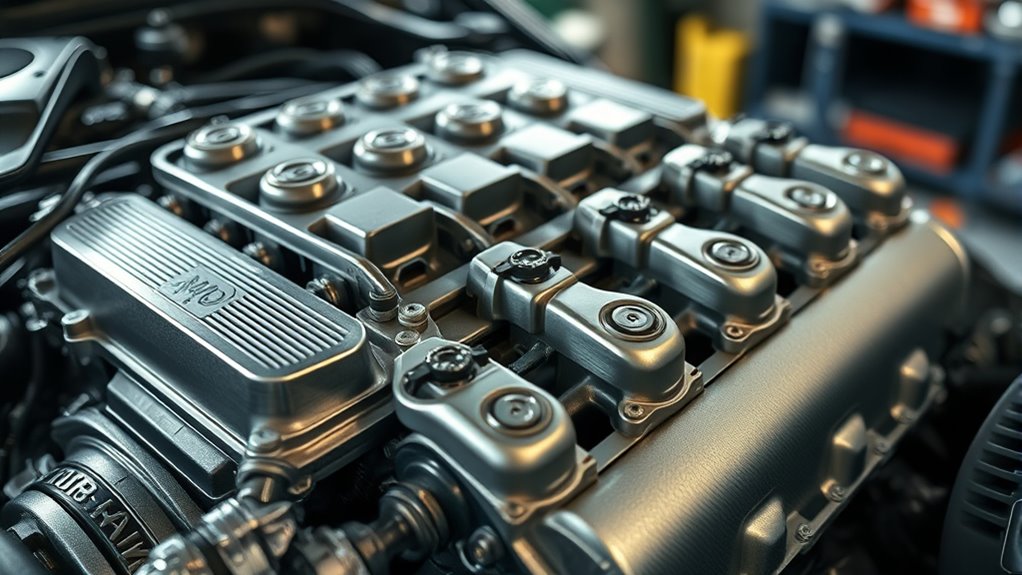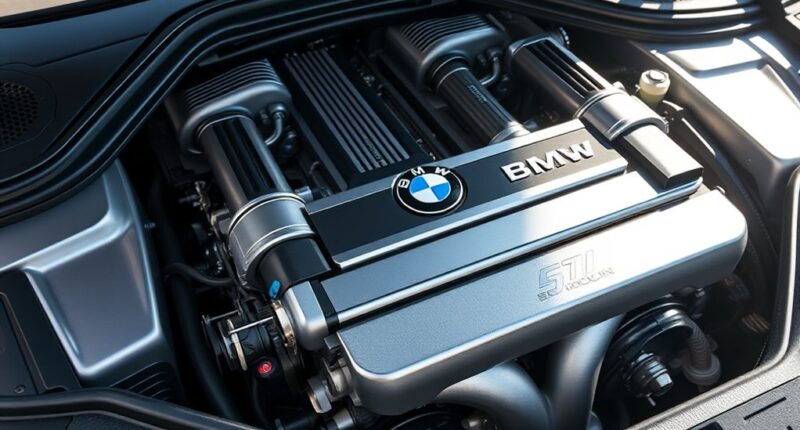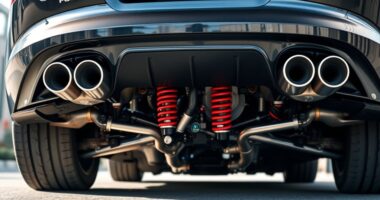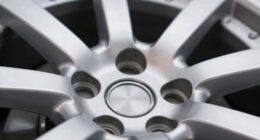BMW’s B-Series engines are turbocharged, combining strong performance with durability, but they can face common issues like turbocharger wear, oil consumption, and cooling system concerns. Regular maintenance—such as oil changes, cooling checks, and timing chain inspections—is key to keeping these engines reliable. If you stay on top of repairs and upkeep, your B-Series engine can deliver many miles of excellent performance. Curious about detailed fixes? Keep exploring to learn how to maintain your engine best.
Key Takeaways
- BMW’s B-Series engines combine turbocharged performance with durable components for reliable daily and enthusiast driving.
- Regular maintenance of oil, cooling systems, and timing components is essential to prevent common issues.
- Turbochargers may need repair or replacement over time due to wear or performance decline.
- Common fixes include seal replacements, cooling system servicing, and timing chain inspections.
- Proper upkeep ensures longevity, consistent performance, and reduces costly repairs of B-Series engines.

Have you ever wondered what makes BMW’s B-Series engines stand out in the automotive world? It all comes down to their blend of turbocharged performance and engine durability. These engines are engineered to deliver power and efficiency, making them a favorite among driving enthusiasts and everyday commuters alike. The turbocharged aspect means you get more horsepower and torque from smaller engine displacements, which translates into quicker acceleration and better fuel economy. This turbocharged performance isn’t just about speed—it’s about creating a responsive driving experience that’s both exhilarating and practical.
BMW’s B-Series engines combine turbocharged power with lasting durability for an exhilarating, efficient drive.
But turbocharged performance also demands high-quality engineering, and BMW’s B-Series engines are built to last. They utilize advanced materials and precise manufacturing processes designed to withstand the stresses of turbocharging and high RPMs. Engine durability is a critical factor, especially since turbocharged engines tend to generate more heat and pressure than naturally aspirated ones. BMW mitigates these issues with robust cooling systems, strengthened internal components, and meticulous quality control. As a result, these engines often outperform expectations in longevity and reliability, provided they receive proper maintenance.
That said, even the most durable engines aren’t immune to issues. Common fixes for B-Series engines often revolve around maintaining their turbo systems and addressing wear on key components. For example, turbochargers may occasionally need repair or replacement if they start whistling or lose boost pressure. Regular oil changes are essential because turbo engines rely heavily on clean, high-quality oil to prevent damage to bearings and seals. Some owners also report issues with the cooling system, so keeping the radiator and coolant levels in check is a simple way to avoid overheating problems.
Another common concern involves valve stem seals, which can wear out over time and cause oil consumption or smoke from the exhaust. Replacing these seals is a straightforward fix that can restore engine performance and efficiency. Additionally, the timing chain or belt can stretch or wear with age, so routine inspections and timely replacements prevent more costly repairs down the line. Moreover, understanding the importance of engine reliability and proper maintenance can significantly extend the lifespan of your BMW’s B-Series engine.
Frequently Asked Questions
How Do B-Series Engines Compare to Other BMW Engine Lines?
When comparing B‑Series engines to other BMW engine lines, you find they offer a good balance of reliability and performance. Their engine compatibility makes them popular for aftermarket upgrades, allowing you to boost power or improve efficiency. Unlike some other lines, B‑Series engines tend to require less maintenance and are easier to modify. Overall, they provide a solid choice if you’re seeking a versatile engine with strong upgrade potential.
What Are the Signs of Impending B-Series Engine Failure?
About 30% of B-series engine failures show early signs, so stay alert. You might notice increased oil consumption or unusual noises, like knocking or ticking, which often indicate wear or impending issues. If these signs appear, it’s vital to get your engine checked promptly. Addressing problems early can prevent costly repairs and keep your BMW running smoothly longer. Don’t ignore subtle cues—your engine’s health depends on it.
Are B-Series Engines Suitable for High-Performance Modifications?
You can definitely consider B-series engines for high-performance modifications, especially with their impressive turbocharging potential. They respond well to aftermarket upgrades, making them popular among tuners. Just keep in mind, you’ll need to reinforce components like pistons and rods to handle increased power. Proper tuning and maintenance are essential to maximize reliability and ensure your modifications deliver the performance you want without compromising engine longevity.
What Is the Typical Lifespan of a B-Series Engine?
Think of your B‑Series engine like a reliable marathon runner; with proper care, it can run for 150,000 to 200,000 miles. Engine longevity varies based on maintenance, driving habits, and repair costs. Regular oil changes and timely repairs help extend its lifespan. If you neglect these, repair costs rise, and the engine may not reach its full potential. Staying proactive keeps your engine running smoothly for years.
How Does Maintenance Differ for B-Series Engines Across Models?
When maintaining your B-series engine across different models, you’ll notice some variations. You need to stay consistent with oil changes and keep the cooling system in check, as these are essential for engine longevity. Some models might require more frequent cooling system checks or oil changes due to design differences. Always follow the manufacturer’s guidelines and adjust your maintenance schedule based on driving conditions to keep your engine running smoothly.
Conclusion
Understanding BMW’s B-Series engines is like having a trusted map for a smooth ride; it helps you navigate potential issues and keeps your car running reliably. With proper maintenance and knowledge of common fixes, you can enjoy your BMW’s performance for years to come. So, treat your engine like a delicate but powerful machine—care for it well, and it’ll reward you with dependable, spirited driving every time you hit the road.









